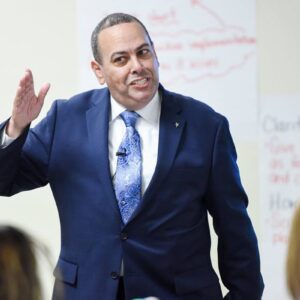
Newark High Schoolers Can’t Read So They’ll Watch ‘The Lego Movie’
August 12, 2025
NJ Education Department Announces New Adaptive State Assessments
August 14, 2025Amplifying Student Voices: Advocating for Younger and More Inclusive Representation in IEP Meetings
David Fishkin is a Political Science student at Rutgers University – New Brunswick. He is diagnosed with Asperger’s Syndrome, now Autism Spectrum Disorder. He is a policy research intern for the New Jersey Policy Institute, a policy think tank. (IMPORTANT NOTE: This op-ed reflects my personal perspective on the IEP system. It is not meant as a critique of my educators, who have consistently carried out their roles with dedication and care. I am deeply grateful for their support and understanding, which have played a significant role in where I am today.)
Held once a year, the Individualized Education Program (IEP) meeting serves as a pivotal moment in shaping the academic future of students with disabilities. These meetings bring together the parent, the educator, and, in some cases, the student to determine whether a child’s educational needs are being met. In theory, it’s a space for collaboration. In practice, it too often sidelines the very person it’s meant to serve, the student – often inadvertently.
New Jersey faces a range of complex challenges in the area of special education—chief among them, the fact that the state has the lowest inclusion rate for students with disabilities in the nation. While there is no single solution to address these systemic issues, we can begin by taking practical, high-impact steps that center the student experience. One such step is lowering the age at which students are mandatorily invited to participate in their IEP meetings—from 14 to 12.
This proposal reflects a broader trend in the State’s initiatives to reform the IEP process by increasing accessibility and transparency for families; however, student voices continue to be sidelined.
With proper support and parental notice, students can start building self-advocacy skills earlier, when it matters most. Requiring students to wait until high school to be encouraged to participate in IEP meetings is simply too late.
But why does it matter?
When students lack a voice, IEP assessments may become less reflective of their actual needs. More importantly, students miss critical opportunities to build self-determination skills that are essential for long-term success.
I know this because I was one of those students.
In my experience, many challenges in special education stem not from intellectual limitations but from a lack of motivation. It was often disengagement (not inability) that held students like me back. When students don’t feel ownership over their education, they struggle to see its relevance.
As a special education student with fluctuating placements, I didn’t always take my education seriously. However, my stance shifted when I began to care about my academic future. Although my academic performance indicated that separate special education courses were no longer appropriate, it was only through self-advocacy and the support of my academic counselors that I was able to transition into mainstream classes.
Transitioning wasn’t easy – and rarely is. Many students in special education aren’t expected to advance beyond it. Today, I’m proud to be a 3.95 GPA student at Rutgers University, recognized with multiple academic and leadership awards.
I am only one student, but my experience shows what’s possible when students are heard. Special education is valuable if students are empowered to be partners in their learning. While attendance is high—94% of eligible students ages 14 to 22 attend their IEP meetings—only a small fraction, approximately 10%, provide significant input. This isn’t a reflection of student capability. Instead, it reveals an overly adult-driven system, one that too often positions students as passive observers in decisions that directly shape their education.
Research supports the benefits of earlier engagement. One study found a “significant, positive association” between student participation in IEP meetings and academic achievement among elementary-aged students with disabilities.
When students lead or contribute meaningfully to their IEP meetings, they become better informed about their accommodations and themselves. Just as important: they gain confidence.
Some may ask: Are all 12-year-olds ready to participate meaningfully in an IEP meeting?
The answer: not always—and that’s precisely why this change matters. Just as we scaffold academic learning, we should also scaffold self-advocacy. We don’t expect students to master complex subjects on day one; the same should apply to developing their voice in the IEP process. Importantly, this proposal does not mandate student participation in every case. It simply ensures that students are invited earlier, and that parents—who know their child best—can help decide when the time is right. The goal is to create a more inclusive process where students feel welcome and empowered to grow into their role over time.
Self-advocacy isn’t a switch that flips at 14 (or even 12). It’s a skill that requires time, guidance, and experience to develop. Starting earlier gives students two extra years to build that skill, so by the time they turn 14, they’re not just ready to attend their meetings – they’re prepared to lead them.



